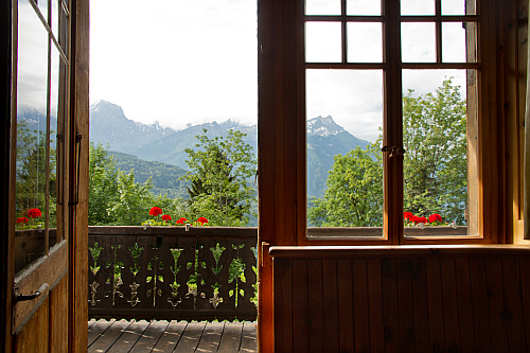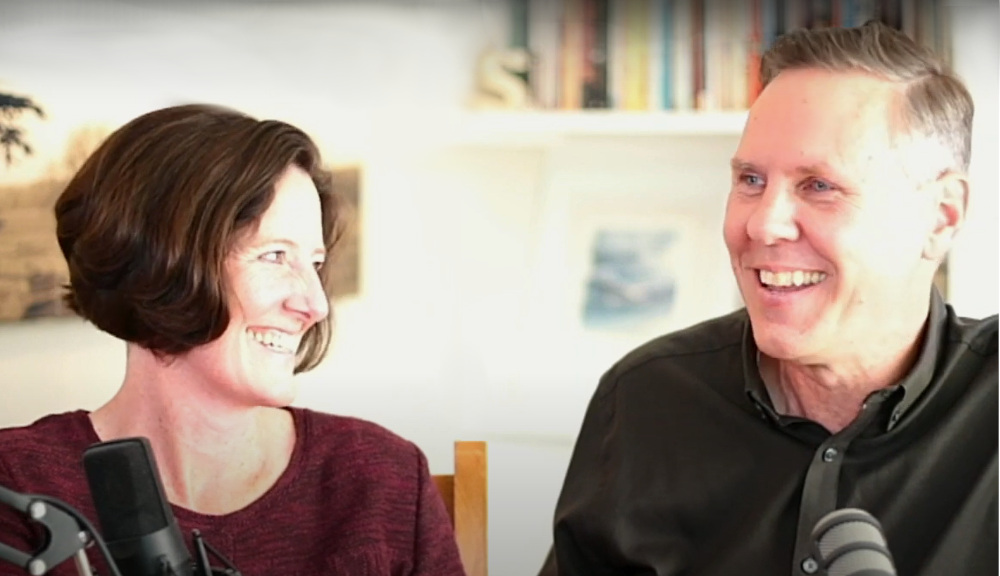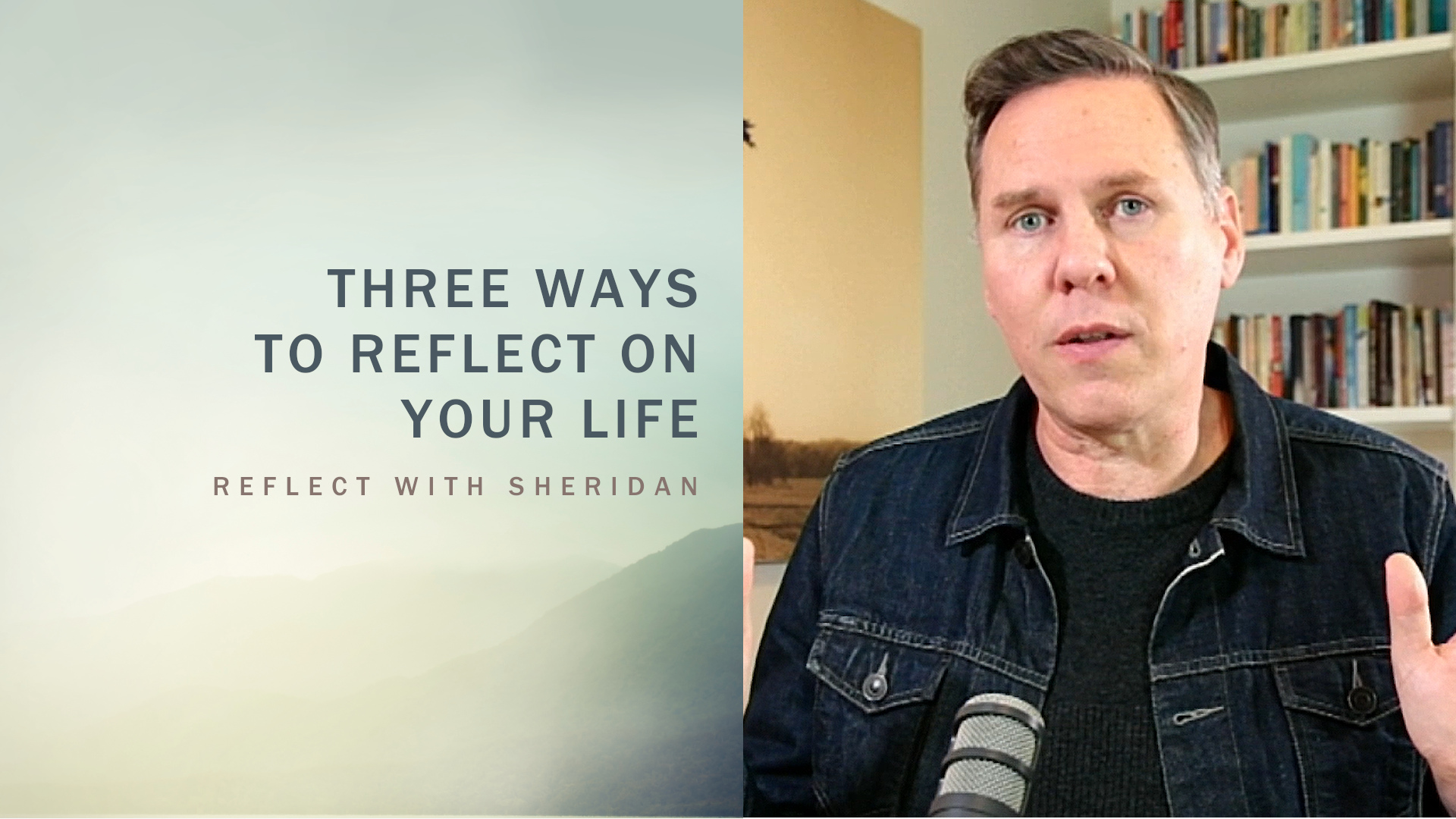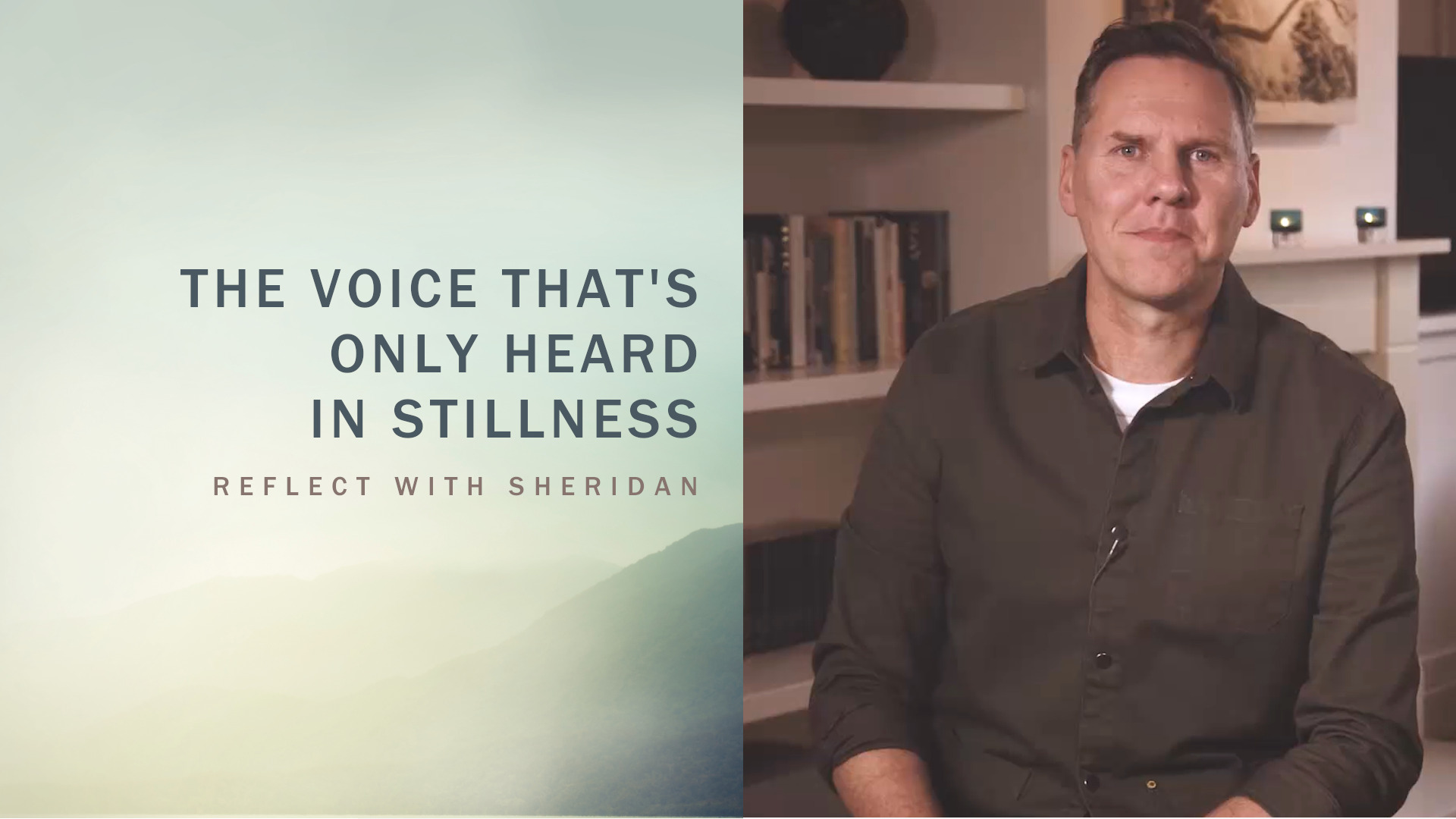What I Found at Swiss L’Abri
In 1955 Francis and Edith Schaeffer established L’Abri (French for ‘The Shelter’) in the cosy Swiss skiing village of Huemoz. Established as a safe place for seekers of truth to bring their questions about life, faith and belief, L’Abri centres have now spread around the world.
I have been significantly shaped by Francis Schaeffer’s life and thought – in particular his insights into reading the spiritual messages in culture – and so it was a privilege to spend two weeks at Swiss L’Abri this month. The L’Abri community holds some wonderful lessons for those of us interested in faith and spirituality.
Here’s what I found at Swiss L’Abri. I also offer some questions to help you implement something similar in your own life.
1. A Retreat from the Distractions of Life
Nestled amongst the snowed-covered peaks of the Swiss Alps, L’Abri is a retreat from life’s many distractions. As the bus winds up the narrow road to Huemoz, advertising billboards give way to the tranquil effects of rolling hills and quaint chalets. The noise and static of city life is replaced by silence, broken only by the chirping of birds and the occasional car or farm truck humming by. No gaudy neon lights here, just flowerboxes filled with bright red geraniums.
The retreat-like conditions continue at L’Abri itself. There are no TVs around, not even in the student common room. No radios are allowed on in rooms (although iPods through headphones are OK during work sessions). You hand your laptop in on arrival, getting it back only on your Thursdays off and on Sunday afternoons. These ‘restrictions’ should in no way be read as either an anti-technology or legalistic bent on behalf of L’Abri. The fact is that it’s hard to focus on the deeper things of life when you’re checking Facebook and streaming online movies.
When you actually take away the laptops, Facebook, TVs and noise, you’re left with one thing:
Relationships.
Relationships with the new friends you’ve made. Relationship with God.
Q: How often do you truly retreat from the distractions of life to focus on God and life’s deeper questions? What would it take for you to do so for a few hours this month?
2. A Safe Place to Doubt (and Discover)
As I got to know the students at L’Abri I discovered that a good number had returned for a second, third or even fourth term. Some visited weekly. Why? L’Abri for them really was a shelter – a safe place to find guidance for their lives, perhaps escape destructive lifestyles, and almost certainly explore some deep questions – or even doubts – they have about God.
Hospitality is the heartbeat of L’Abri. On arrival you are warmly welcomed by workers, helpers and fellow students alike, and that hospitality is granted to all, irrespective of faith or philosophy. Right from the beginning L’Abri has attracted both believers and sceptics. And while L’Abri is unashamedly a place of Christian reflection, no one is pushed into a corner and forced to ‘believe’. This is a space to freely and honestly address questions of faith, reason, science and the validity of Christianity.
One of the forums for exploring these questions is the Formal Lunch. During these meals students are invited to pose a question for discussion. Some of the questions asked during my visit included:
- What do I say to a child who says he’s gay?
- Is time really linear or is it cyclical, as some ancient societies have believed?
- What is eastern meditation, and how does it differ from Christian prayer?
- Do believers in God ever consider that the ‘answers’ they get to prayer might simply be their own psychological expectations fulfilled?
In some Christian contexts such questions would be met with awkwardness or even defensiveness. In some secular settings a faith-positive slant to the discussion would be quickly ridiculed. L’Abri is a safe space to bring your doubts and make a few discoveries.
Q: Do you have a safe place to bring your deepest faith questions? How could you create such space for others?
3. A Balanced Rhythm
L’Abri is first and foremost a community, and in a community all members pull their weight. If you were getting the impression L’Abri was a quiet retreat centre, think again! Days are in fact quite full, though not frantic or overly exhausting. This balance is achieved through a rhythm of work-study-rest/play that I found personally beneficial.
A typical day at L’Abri looks a little like this:
8.00am: Breakfast
9.30am: Work around the property, or study period (depending on schedule)
1.00pm: Lunch
3.00pm: Study period, or work around the property
6.00pm: Dinner
7.30pm: Free time
At least two lectures are added to the schedule each week, plus personal tutorial sessions, and daily wash up duties. Accommodation fees at L’Abri are ridiculously cheap (especially given Switzerland’s astronomical economy), and this is achieved in part by students getting involved in cooking, weeding, washing and painting around L’Abri. Beyond that, work periods are wonderful for building community and also fly the flag for a holisitic faith that embraces all of life.
I found this daily rhythm of work-study-rest/play something of a wake-up call. Left to my own devices I tend to become all-consumed in my work. I can write all day and miss lunch. I always pull long hours when prepping for a radio show. The result is often mental and emotional exhaustion at the end of the day. At L’Abri study sessions (the sessions I’d be most tempted to overdo!) were always limited, balanced with meal times, physical work, and fun conversation.
Q: How is your ‘life rhythm’? In what ways do you struggle with either workaholism or laziness? How are you at balancing time for work, rest/play, and study or spiritual pursuits?
4. Guided Journeying
Not all visitors to L’Abri arrive with a burning question on their souls. (One pastor I met was spending a week of his sabbatical there simply catching up on books he wanted to read.) But many do come with questions. This intellectual journey is guided and nurtured in three ways:
- Weekly lectures: from L’Abri staff like Greg Laughery, Richard Bradford and Karryn Goldsworthy, and visiting lecturers (my visit coincided with stimulating visits by worldview expert Michael Goheen and art historian Henry Luttikhuizen).
- Small Group Discussion: at Formal Lunches and the like.
- Personal Mentoring: On arrival, each student is assigned a tutor with whom they meet weekly to discuss the progress of their studies.
The personal mentoring mentioned above is a most important component in the L’Abri experience. Tutors don’t preach or heavily direct, but guide students with reading suggestions, resources, discussion and, where necessary, a gentle challenge.
I decided to use my time at L’Abri exploring the significance of the atonement – what Jesus’ life, death and resurrection really means – and found my two discussions with Richard Bradford on that and other matters thoroughly enjoyable.
You don’t come to L’Abri to find simplistic answers to life’s problems. Here you’re pushed to think deeply and consistently. The Farel House library contains Nietzsche and Dawkins, not just Lucado and Yancey. While a relatively small library, the breadth of its titles suggests a willingness to take critics seriously.
Q: Who is guiding you on your own journey of doubt and discovery? Do you have a mentor who challenges you to think clearly and consistently about faith matters?
Was Anything Missing?
Anyone familiar with Francis Schaeffer’s books – like his triology or the equally influential How Should We Then Live
– know that he was an immense intellect. Thankfully, this intellectual approach pervades Swiss L’Abri today, providing a high-calibre response to Christianity’s cultured critics in a way that feels neither stuffy nor proud but fresh and charitable. Of course, when the intellect is taken seriously there is always the possibility of things becoming overly cerebral.
This possible downside may be one reason why Mondays at L’Abri are ‘prayer days’. After some devotional input from a L’Abri worker (in the form of a book reading), there is time for group prayer. Students then sign up to pray for a 30 minute period during the day for their own needs and L’Abri’s. (It can be safely said that L’Abri lives by prayer. Fees are kept low, finances are always tight, L’Abri policy is to pray for funds rather than fundraise and, remarkably, 50 years later they’re still running.)
I came away from my L’Abri experience, however, wondering if this was enough. With 25-odd people in the prayer meetings during my visit, few people felt comfortable sharing any real personal needs in such a large group. Apart from saying grace before meals, this was the only corporate experience of prayer experienced.
I wondered what L’Abri might be like if its daily rhythm mirrored the monastic pattern of work-prayer-study-rest/play. Job had many philosophical, theological and intellectual questions about God, but when God spoke to him personally his life was transformed without one of his questions answered. I longed for more guided moments for such God encounters.
Q: Are you overly reliant on one spiritual practice? Of the basic disciplines of Bible study, prayer, fasting, solitude, silence, community, and guidance/mentoring, which are you weak in?
A Treasured Moment
One evening Merryn and I walked up a scenic hill to pray with another couple of L’Abri students. These two new friends shared with us how much they and others had changed while at L’Abri, despite any perceived weaknesses with the place.
Merryn and I spent two weeks at Swiss L’Abri – barely enough time to experience its benefits. We left with wonderful memories, some new friends, a possible future relationship with L’Abri and some new insights and discoveries.
God is using L’Abri powerfully. I hope you’ll visit one day.






Martin Johnson
Sheridan, nice piece. I haven’t been there. but grew up reading and hearing about L’Abri. Sounds like a little piece (peace) of heaven.
Sheridan Voysey
Thanks Martin. I’ll be looking forward to connecting to the English L’Abri crowd at some stage. There’s a Australian centre too – at Camden.heaven.
Lyndal Mitchell
Oh Sheridan, how wonderful! I’m so glad you had this opportunity for such beautiful, holy days. I pray I will be able to do the same one day. My spirit was refreshed and strengthened just reading of your experience!
Your question about the place of prayer is interesting. Were you able to give this feedback to the staff? It sounds like a very valid suggestion to incorporate more prayer in the daily rhythm of life at L’Abri. Is prayer a significant part of the weekly meeting with your tutor? Is there a set amount of time for those meetings, or are they open-ended?
Thank you for posing the questions at the end of your reflections. I will incorporate them into my quiet times over the next week or so, although the answer to some of them is really the work of a lifetime!
Thank you (as always) for such wholesome soul-food.
Grace and peace,
Lyndal
Sheridan Voysey
I do hope you get there, Lyndal! It was a wonderful experience which I think you’d get a lot out of.
I know that my suggestion regarding prayer could be an interesting experience for the seekers / non-Christian students at L’Abri, of which there are many, and so the L’Abri staff have probably thought some of these things through. (I still think the idea has validity though, even for seekers).
In terms of the tutor meeting, they go for about an hour each week and I know some people did have significant prayer times during these meetings. Prayer is certainly a part of L’Abri life, just in a more quiet way.
I hope the reflection questions yeild fruit this week for you!
Lesley Wheaton
I lived in Swiss L’Abri in the mid 70’s when there was no technology to distract you…. Just the magnificent Les Dent du Midi !
I read recently that Francis Schaeffer was one of the most influential christian thinkers of the 20th century. True! He talked about what a post modern, post christian society would look like – and we see it today.
Sheridan Voysey
So true, Lesley. He was a landmark figure in Christian thinking that reached those outside academia.
Glenn
I found this nine year old post most helpful. I was deeply privileged to be able to spend 3 weeks at L’Abri in Southborough, MA, USA (1 hour drive west of Boston) around the same timeframe. This would have been helpful reading beforehand. Especially the well considered questions. Thanks
Sheridan Voysey
Thanks Glenn. Glad you got to experience L’Abri.
Sheila Whittam
I came to be a believer in the 70s and heard a lot from friends here in Australia .. Moral Rearmament movement I believe made some following of LA’bri
Can you tell me if Franky Shaeffer , I read his books, tell me if he still connects with your group.